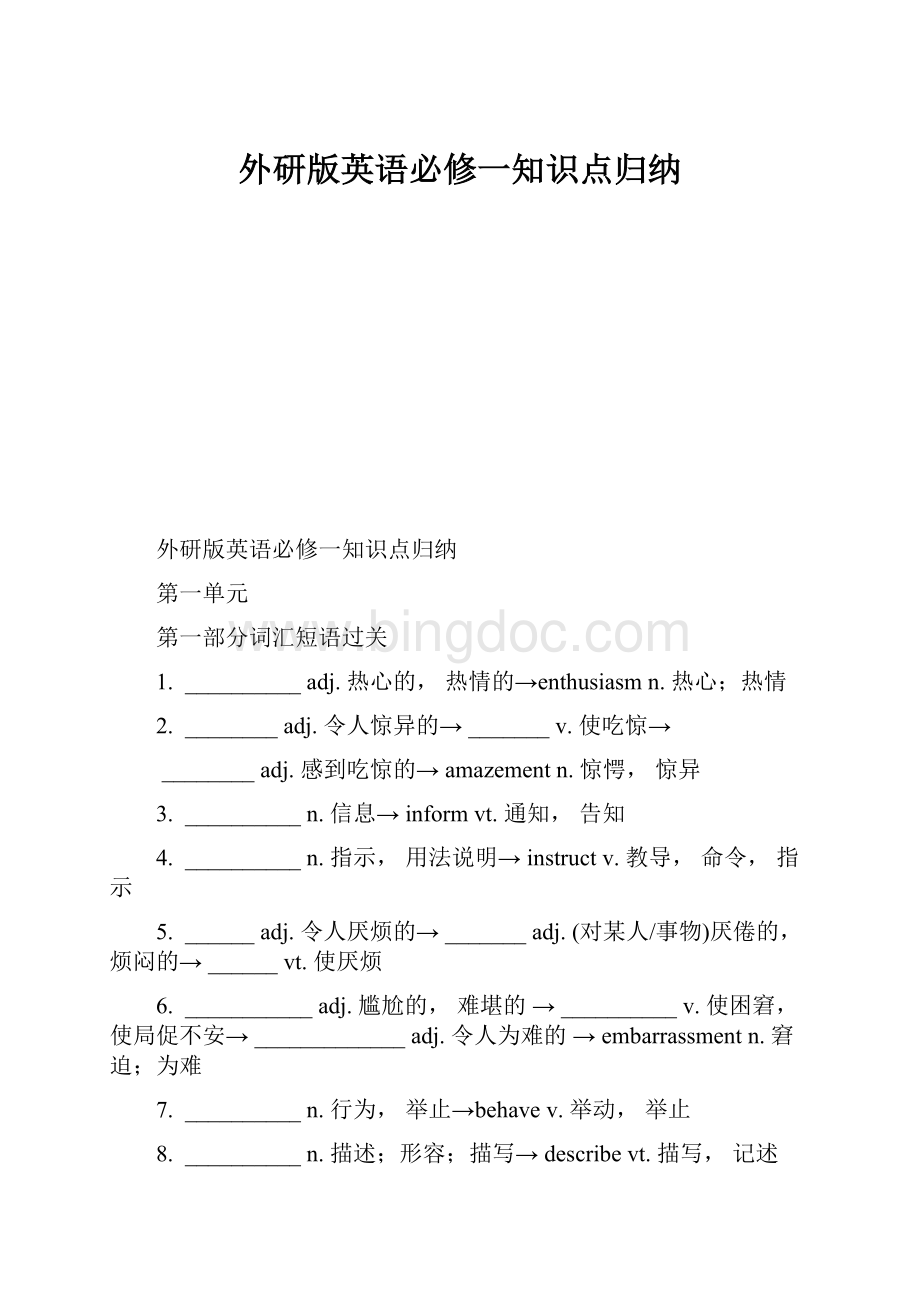外研版英语必修一知识点归纳.docx
《外研版英语必修一知识点归纳.docx》由会员分享,可在线阅读,更多相关《外研版英语必修一知识点归纳.docx(27页珍藏版)》请在冰点文库上搜索。

外研版英语必修一知识点归纳
外研版英语必修一知识点归纳
第一单元
第一部分词汇短语过关
1.__________adj.热心的,热情的→enthusiasmn.热心;热情
2.________adj.令人惊异的→_______v.使吃惊→
________adj.感到吃惊的→amazementn.惊愕,惊异
3.__________n.信息→informvt.通知,告知
4.__________n.指示,用法说明→instructv.教导,命令,指示
5.______adj.令人厌烦的→_______adj.(对某人/事物)厌倦的,烦闷的→______vt.使厌烦
6.___________adj.尴尬的,难堪的→__________v.使困窘,使局促不安→_____________adj.令人为难的→embarrassmentn.窘迫;为难
7.__________n.行为,举止→behavev.举动,举止
8.__________n.描述;形容;描写→describevt.描写,记述
9._______vt.使(人)印象深刻;使铭记→__________n.印象,感想→impressiveadj.令人印象深刻的
10.__________n.纠正,改正→correctadj.正确的→_______v.改正,纠正,批改
11.__________v.鼓励,激励→__________adj.鼓舞人心的→___________adj.受到鼓舞的,更有信心的→encouragementn.鼓励,奖励
12.enjoymentn.享受,乐趣→_______v.享受,喜欢→________adj.令人愉快的,有乐趣的
13.fluencyn.流利,流畅→_______adj.流利的,流畅的
14._____________adj.失望的→______________adj.使人失望的,令人失望的→disappointvt.使失望→_____________n.失望
15._________n.助手,助理→assistv.帮助
短语检测
1.与……相似
2.某人对(做)某事的态度
3.离……远,远非
4.一点不像,与……完全不同
5.玩得很开心
6.起初,一开始
7.换句话说
8.期待;盼望
9.对……印象深刻
10.在……开始的时候
11.在……结束的时候
12.被(划)分成……
13.参加
14.课外活动
第二部分语法精讲
一.because,since,as,for,becauseof的区别(语气由强到弱)
(1)because表示的原因是必然的因果关系,语气最强,通常放在主句之后,有时也放在主句之前。
(2)回答why提出的问题,只能用because,不能用其余三者。
如:
A:
Whycan’tIgo?
我为什么不能去?
B:
Becauseyouaretooyoung.因为你太年轻了。
(3)because引导的从句可用于强调句,其余三者不能。
哪:
It’sbecauseheiskindthatwelikehim.
是因为他对人友好,我们才喜欢他。
(4)because从句可用表语,其余三者不能。
如:
Thisisbecausetheearthistravellingroundthesun.
这是因为地球在围绕太阳转。
(5)not…because这一结构中的not有时否定主句,有时否定从句,一般应根据句子的意思作出正确的(合逻辑的)理解。
若not否定主句,最好在because之前用逗号,否则容易引起歧义:
Ididn’tgobecauseIwasafraid.
1)我没有去是因为我怕。
2)我不因为怕才去。
不过若because之前有just修饰,一般认为not只能否定从句。
如:
Youshouldn’tgetangryjustbecausesomepeoplespeakillofyou.不要因为有些人说你的坏话而生气。
(6)表示“……的原因是因为……”这一意义时,一般要用Thereasonwhy…isthat…。
如:
Thereasonwhyhecannotcomeisthatheisill.他不能来的原因是(因为)他病了。
注:
在阅读中有时也可见到Thereasonwhy...isbecause...这样的说法,但比较少见。
2.关于since和as
(1)since和as表示的原因是人们所知的,是对已知事实提供理由,而不表示直接原因。
since比as语气稍强,且比as略为正式,两者通常都放在主句之前,有时也放在主句之后。
如:
Sinceyoufeeltired,youshouldrest.既然你感到累了,你应该休息。
Ashewasnotwill,Idecidedtogowithouthim.因为你身体不好,我决定独自去。
(2)since可用于省略句,而其它三者不能。
如:
Sinceso,thereisnomoretobesaid.既然如此,就再没有什么好说的了
(3)since“因为,既然”侧重主句,主句表示显然的或已知的理由。
强调说话者和听者双方都知道的原因,常译为“既然”,一般用在这样的句子里。
例如:
Sincewe'vegotafewminutestowaitforthetrain,let'shaveacupofcoffee.
(4)as是从属连词,说明一般的因果关系,语气比because弱,说明比较明显的原因,它引导的从句通常放在句首,有时也可放在句末。
例如:
Asitisraining,you'dbettertakeataxi.
天下雨了,你最好乘出租车。
3.关于for
(1)for是并列连词(其作三者为从属连词),它有时可表示因果关系(只能放在主句之后,且可与because换用),有时不表示因果关系,而是对前面分句的内容加以解释或推断(也只能放在主句之后,但不能与because换用)。
如:
Thegroundiswet,for(或because)itrainedlastnight.地面是湿的,因为昨晚下过雨。
Itrainedlastnight,for(不能用because)thegroundiswetthismorning.昨晚下过雨,(你看)今天早上地面都是湿的。
(2)for“因为,由于”表明附加或推断的理由,引导的分句前常有逗号。
for分句不放句首.是用来附带解释或说明前一分句的原因和理由。
例如:
Daybreaks,forthecockcrows.
Itmusthaverainedlastnight,forthegroundiswet.
Iwon'tgoin,formyfatheristhere.
(5)becauseof是介词短语,在句子作状语,后面只能跟名词,代词,或者what引导的从句。
Becauseofmybadleg,Icouldn’twalksofastastheothers.由于我的腿坏了我不能像其他人走得那么快。
置于句首做状语但用逗号与其他部分分开
Becauseofhiswife’sbeingthere,Isaidnothingaboutit.因为他妻子在场我对此事只字未提。
(接-ing分词)
Herealizedthatshewascryingbecauseofwhathehadsaid.他意识到她在哭是因为他说的那些话。
(接what从句)
练习:
用because,since,as,for,becauseof填空
1.Whydoyouliketheteacher?
----_________heiskindandenthusiastic.
2.Itwas_____hismotherwasillthathecametoschoollatethismorning.
3._____itishot,let’sgoswimming
4.Parentsshouldtakeseriouslytheirchildren’requestsforsunglasses_______eyeprotectionisnecessaryinsunnyweather.
5.______hecan’tanswerthequestion,you’dbetterasksomeoneelse.
6.Herealizedthattheteacherwasangry_______whathehadsaid.
7.________Ihaven’tseenthefilm,Ican’ttellyouwhatIthinkofit.
8.Thedaysareshort,for________itisnowDecember.
改错
1.Theydidnotwantbreakfastbecausethattheyweregoingoutearlyinthemorning.
2.Becausethehelpyougavemethatsummer,mylifechanged.
二.besimilarto:
与......相似
TheweatherofBeijingissimilartothatofNewYork北京的天气与纽约的天气很相似
Bedifferentfrom与...不同。
Theirtastesaredifferentfrommine他们的爱好与我的不同。
(1)Yourviewsoneducationaresimilar_____mine.
AinBtoCfromDwith
(2)IsawnodifferenceinParis.It’sjustlikeourShanghai.
AsimilarBlikelyClikeDsame
besimilarin在...方面相似Thetwohousearesimilarinsize.
翻译:
(1)她在很多方面与她妈妈相似
(2)他的外套和你的相似。
三..–ed形容词和–ing形容词的用法区别
传统的观点许多参考书认为:
-ing形容词与表示事物的名词连用,-ed形容词与表示人的名词连用。
此说法在很多情况下是可行的,但表述欠准确,在许多情况下却是不可靠的。
如-ing形容词用于人的情况就比比皆是:
假若你的老师说话幽默、讲课生动,那么不仅他的课非常interesting,而且你会说他是一个interestingman(有趣的人)。
比较:
I’minterestedininterestingpeople.我对有趣的人感兴趣。
Hewasworriedabouthisworryingson.他为他令人担忧的儿子感到担忧。
Hewasannoyedwiththeannoyingperson.他对这个讨厌的人很生气。
另一方面,-ed形容词用于指物的情况也不少见。
比较并体会:
afrightenedlook害怕的表情(指带有这种“表情”的人感到害怕)
afrighteninglook吓人的表情(指这种“表情”令人害怕)
anexcitedtalk心情激动的谈话(指“谈话”的人心情激动)
anexcitingtalk令人激动的谈话(指听“谈话”的人心情激动)
由于传统的观点说得太绝对,有时做起题来还可能会因此掉入命题人的陷阱
_____doyouthinkofyourEnglishteacher?
Ishe_______?
A.What,interesting B.What,interestedC.How,interesting D.How,interested
正确的观点关于-ing形容词与-ed形容词的区别,比较准确的表述应该是:
1.以后缀–ed结尾的形容词(如ashamed,delighted,excited,frightened,interested,moved,pleased,surprised,worried等)通常用于说明人,不用于说明事物,即使它们所修饰的名词是事物,那它们指的也是与该事物相关的人。
如:
Hehadapleasedsmileonhisface.
他脸上露出了满意的微笑。
Hetoldmethenewsinaveryexcitedvoice.
他声音很激动地告诉了我这个消息。
第一句中的apleasedsmile意为“满意的微笑”,它指的是某人因感到满意发出的微笑;
第二句中的averyexcitedvoice指的是“很激动的声音”,即指的是某人因很激动而发生那样的声音。
原则上,-ed形容词通常直接用于说明人,若修饰事物,则多为air(神态),appearance(外貌),cry(哭声),face(表情),voice(声音),mood(情绪)<'TimesNewRoman'">),mood(等显示某人的情感状况的名词。
2.以后缀-ing结尾的形容词(如delighting,exciting,frightening,interesting,moving,surprising,worrying等)主要用于说明事物,表示事物的性质或特征,若用它们说明人,则表示此人具有此性质或特征。
如:
Thestoryisveryinteresting.这个故事很有趣。
Themanisveryinteresting.这个人很有趣。
请再比较并体会以下句子:
Heisfrightened.他很害怕。
Heisfrightening.他很吓人。
Hehasafrightenedlookonhisface.他脸上带有惊恐的神情。
Hehasafrighteninglookonhisface.他脸上带有吓人的神情。
Ireadaninterestedexpressiononhisface.我看到他脸上露出一种感兴趣的表情。
Ireadaninterestingexpressiononhisface.我看到他脸上露出一种有趣的表情。
学练结合请做做以下试题,看你是否能克服原来的思维定势,能否跳出命题人的陷阱:
1.Lawsthatpunishparentsfortheirlittlechildren’sactionsagainstthelawsgetparents_____.
A.worried B.toworried C.worrying D.worry
2.Thelittleboyisn’tgettingonwellinmathsandworsestill,heisevenunwillingtogotoschool.Withherson_____,shefeelsvery______.
A.disappointing;worrying B.disappointing;worried
C.disappointed;worried D.disappointed;worrying
3.AftertheAnti-terroristWar,theAmericansoldiersreturnedhome, ______.
A.safebuttired B.safelybuttired C.safeandtiring D.safelyandtiring
4.Asweallknow,typingisa______jobtoa______heart.
A.tired;tired B.tired;tiring C.tiring;tired D.tiring;tiring
5.Poorboy!
His________looksand________handssuggestedhewasveryafraid.A.frightful;trembling B.frightened;trembling
C.frightening;trembled D.frightened;trembly
说明主语因……而产生的情绪反应,从而影响到人的身体部位……trembling。
ed形式及常见短语与ing形式形容词归纳
excited(be~dabout) /exciting
surprised(be~dat)//surprising
amazed(be~dat) //amazing
embarrassed(be~edin)//embarrassing
encouraged(be~edat/by) /encouraging
frustrated(be~dof) /frustrating
interested(be~edin)/interesting
thrilled(be~edat)/thrilling
terrified(beterrifiedat/of/with) /terrifying
pleased(be~dwith) /pleasing,=pleasant
satisfied(besatisfiedwith)/satisfying
frightened(be~edat/of) /frightening
tired(be~dof) /tiring
bored(be~dwith) /boring
relaxed(无固定搭配) /relaxing
fascinated(be~dby) /fascinating
annoyed(be~edwith) /annoying
moved(be~dby) /moving
worried(beworriedabout) / worrying
confused(beconfusedabout) /confusing
练习:
一用括号内所给动词的-ed形式或-ing形式填空
1.Thechildrenwere____afterthetrip.(tire)
2.Thetripwas____.(tire)
3.The____childrenwenttobedearlyafterthetrip.(tire)
4.The____triplastedawholeday.(tire)
5.Thetripmadethechildren____.(tire)
6.Thebadweathermadethetrip____.(tire)
7.Tom’sparentsare____athis____resultsoftheexams.(disappoint)
8.____andangry,heleftthemeeting-room.(disappoint)
9.Itis____thathedidn’tpasstheexamination.(disappoint)
10.Whenhearingthe____newsthatMichaelJacksonpassedaway,theywere____tolookateachother.(surprise)
11.Hewas____abouthis____son.(worry)
12.I'mnot____withhisinterpretationofthissentence.(satisfy)
13.Hewas____withthe____person.(annoy)
14.Apolicecarappearedontheroad,thethiefhada____lookonhisface.(frighten)
15.Thesituationhereis____andweare____.(encourage)
二 巩固练习:
1.Thewetweatherwillcontinuetomorrowwhenacoldfront______toarrive.(2008·全国卷I)
A.isexpected B.isexpecting C.expects D.willbeexpected
2.—DoyouknowifTerrywillgocampingthisweekend?
(2008·上海高考)
—Terry?
Never!
He_____tentsandfreshair!
A.hashated B.hated C.willhate D.hates
3.Bythetimeherealizeshe____intoatrap,it’llbetoolateforhimtodoanythingaboutit.(2008·山东高考)
A.walks B.walked C.haswalked D.hadwalked
4.Sofarthisyearwe______afallinhousepricesbybetween5and10percent.(2008·福建高考)
A.saw